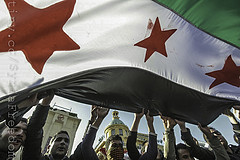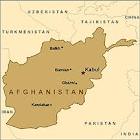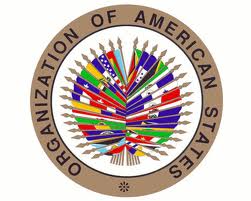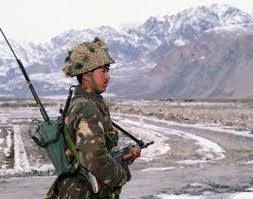
Dambisa Moyo’s Resource War Argument is Flawed
Bestselling author, financial economist (and Oxford alumnus) Dambisa Moyo argues in her new book that the rise of China is generating unanticipated consequences for the international system and that no one — bar the Chinese Communist Party — is actively thinking about how to handle the long term fallout of these seismic shifts. I debated some of these ideas with her on Radio 4’s Today Programme a couple of days ago. One of Moyo’s controversial arguments is that China’s ascendency doesn’t just put tremendous pressure on commodity markets, but is likely to represent such a big demand shock that supply of key resources simply can’t keep up. The consequence, for Moyo, is then that as countries — and the planet …
ICC Captive Is Pawn in Struggle between Militias and the NTC
The key fault lines dividing the interim Libyan central government from both the militias and the international community are starkly illustrated in the ongoing saga surrounding the detention of four International Criminal Court (ICC) officials in Libya since June 7th. Among the detainees, Melinda Taylor has received the brunt of media attention, because she is a young and attractive Australian lawyer who was assigned by the ICC to represent the deposed dictator’s son, Saif al-Islam al-Qadhafi. She is currently being held captive by Zintani militiamen for ‘spying’. She allegedly possessed a digital pen camera and passed her client encrypted messages from Mohammad Ismael — a former crony of Saif’s, wanted for war crimes. It will likely be impossible for the …

Lifting the Siege: Protecting Civilians in Syria
Even the most zealous ideologues have been challenged approaching Damascus. Thrown from their horse, they have been left dazed and partially sighted, forced to re-examine their norms. Damascus has presented such a challenge once again in recent months. This time, it is the new norm in international relations known as R2P—the responsibility to protect—that has been temporarily unseated. It is a simple formula. This important new norm contends that it is the international community’s responsibility to protect civilians when a state fails in its responsibility to do so. R2P has made swift progress in the international community since its adoption (in a watered-down form) at the United Nations Summit in 2005, gaining acceptance at the same time as the rise …

Conference Report: The Egyptian Revolution, One Year On
Having toppled a dictator of thirty years in the uprisings of January and February 2011, millions of Egyptians looked ahead to a future of comprehensive change. In May 2012, they faced the disturbing prospect of choosing a new president from a list that included Mubarak’s last prime minister, and foreign minister. When the former, Ahmad Shafik, was allowed to pass through to the second electoral round, waves of nationwide protest decried his candidacy. Yesterday, to the alarm of pro-revolution political forces, the High Constitutional Court dissolved parliament, and legislative powers passed to the ruling military council. Several prominent activists have slammed the entire transitional process, and have been protesting with fellow Egyptians to boycott a poll they dismiss as illegitimate …

Promise and peril of NATO’s ‘irreversible’ exit from Afghanistan
With the military campaign in Afghanistan in the middle of its eleventh year, NATO has firmly moved from what is idealistically desirable to what is realistically achievable in the war-torn country. Over a decade ago, NATO intervened in Afghanistan with post-Cold War ambition. But the experience in Afghanistan, where the battle with Taliban-led insurgents is far from over, has put many off protracted peacekeeping missions. The US, who went into Afghanistan with a neoconservative mission of turning a tribal system upside down, is finally settling for an imperfect yet “responsible end” to a prolonged, unpopular, costly and deadly war. At the recently-held summit in Chicago, NATO leaders announced an “irreversible” three-stage security transition plan. Under the plan, Afghan National Security Forces …
Political-Economic Roots of Haggling in Dakar
I was recently traveling in Dakar, Senegal. I was there visiting an American friend, I will call her A, who has been teaching English language at a local high school for three years. One evening we were hailing a taxi across town, accompanied by a friend of A who is also an American and a high school teacher in the city; I will call her B. My friend negotiated the price of the taxi prior to our taking a seat, as is the custom in Senegal. The taxi man insisted that the price was 2,500 CFA (500 CFA: $1US: £0.62BPS) and A insisted that we pay 2,000 CFA, the price that the Senegalese routinely pay to get across town. The …

Coordination in the Fight Against Transnational Organised Crime in the Americas: another band-aid solution?
In light of last month’s VI Summit of the Americas in Cartagena, Colombia, it seems obvious and commendable that the Secretary General of the Organization of American States (OAS), José Miguel Insulza, would call on the leaders of the region Friday to help coordinate the fight against transnational organised crime. The threat is, he claimed, the “main challenge to security in our hemisphere.” Insulza’s call comes on the heels of the adoption in Cartagena of Mexico’s proposal to create an Inter-American Centre for Coordination against Transnational Organised Crime. It is clear that dealers in drugs, arms and human trafficking (these items increasingly the wares of the same criminal merchants) do not limit their activities to the confines of national borders. And …

Madness over the Himalayas: Time to demilitarise the Siachen Glacier
For nearly three decades, India and Pakistan have engaged in a maddening conflict over Siachen Glacier in the Himalyan peaks of the disputed Kashmir region. The “world’s highest battlefield” has claimed thousands of lives due to hostile weather conditions—frostbite, avalanches and blizzards—along with over a hundred soldiers killed in sporadic combat until 2003, when the two countries agreed to a ceasefire across the Line of Control in Kashmir. The weather’s latest victims are 139 Pakistani soldiers who were buried deep in snow after an avalanche hit their Gyari battalion headquarters on April 7. Since then, the worsening weather has prevented the rescuers to gain access even to their dead bodies. Sustaining a conflict for so long at an altitude of …









